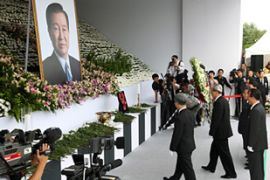N Korean envoys meet South’s Lee
Leader’s message on “progress in co-operation” conveyed to the South Korean president.

Kim Dae-jung’s engagement policy and aid to the impoverished North during his 1998-2003 presidency earned him the Nobel Peace Prize in 2000 and he held a landmark summit with Kim Jong-il the same year.
More than 20,000 politicians, foreign dignitaries and ordinary people attended the state funeral for Kim in Seoul on Sunday.
‘Totally delighted’
Don Kirk, a North Korea specialist and correspondent for the Christian Science Monitor newspaper, said Kim would have been “totally delighted” that the meeting between the [South Korean] president and the North Korean delegation was taking place.
“He believed that President Lee’s so-called hard line was not doing much good in terms of reconciliation. So wherever he is now, I’m sure he’s very happy,” Kirk said.
| In depth | ||
|
|
However, it is unclear whether the apparent breakthrough in inter-Korean relations is just a “temporary warming”, Kirk said.
“It would appear that there’s sort of a breakthrough but there’s a huge qualification: no one is saying anything about North Korea’s nuclear weapons programme and, in fact, President Lee is saying that his policy is not changing.”
South and North Korean officials in charge of inter-Korean relations met in Seoul on Saturday for the first time in nearly two years to discuss various issues of common interest.
Kim Yang-gon, the visiting North Korean spy chief, who also handles issues related to the South, said: “After meeting with several people [in the South], I felt the imperative need for North-South relations to improve.”
A small group of protesters staged an anti-North Korean rally close to the hotel where the North Korean delegation was staying.
‘Exploiting rifts’
Commenting on the Seoul talks, Paul Chamberlin, the author of Korea 2010: The Challenges of the New Millennium, told Al Jazeera: “The North Koreans are trying to exploit rifts in South Korean politics and political society.
“Kim Dae-jung was a progressive, he wanted to improve relations with North Korea with an engagement policy and he was succeeded by another progressive – which never really improved inter-Korea relations in any kind of substantive way.
“Now with the death of Kim Dae-jung, they have sent their head of the spy service as the envoy for Kim Jong-il to convey a private message to Lee Myung-bak.”
He said the message might be “we want to improve relations, why don’t you send us humanitarian assistance”.
Pyongyang’s message
Chamberlin said the message is “not likely to play out very nicely” with Lee Myung-bak’s policy.
“But among South Koreans there is a desire to improve relations,” he said, “and I would not be surprised if the real game is to try to implant among South Korean progressives this notion that if they lean on Lee Myung-bak to change his policy, inter-Korean relations will improve.”
The last time officials responsible for inter-Korean affairs met was in late 2007 under the administration of South Korea’s Roh Moo-hyun.
Cross-border tensions have risen sharply in recent months after the North made threatening gestures to the South, fired a series of missiles and staged a second nuclear test which resulted in tougher UN sanctions.

